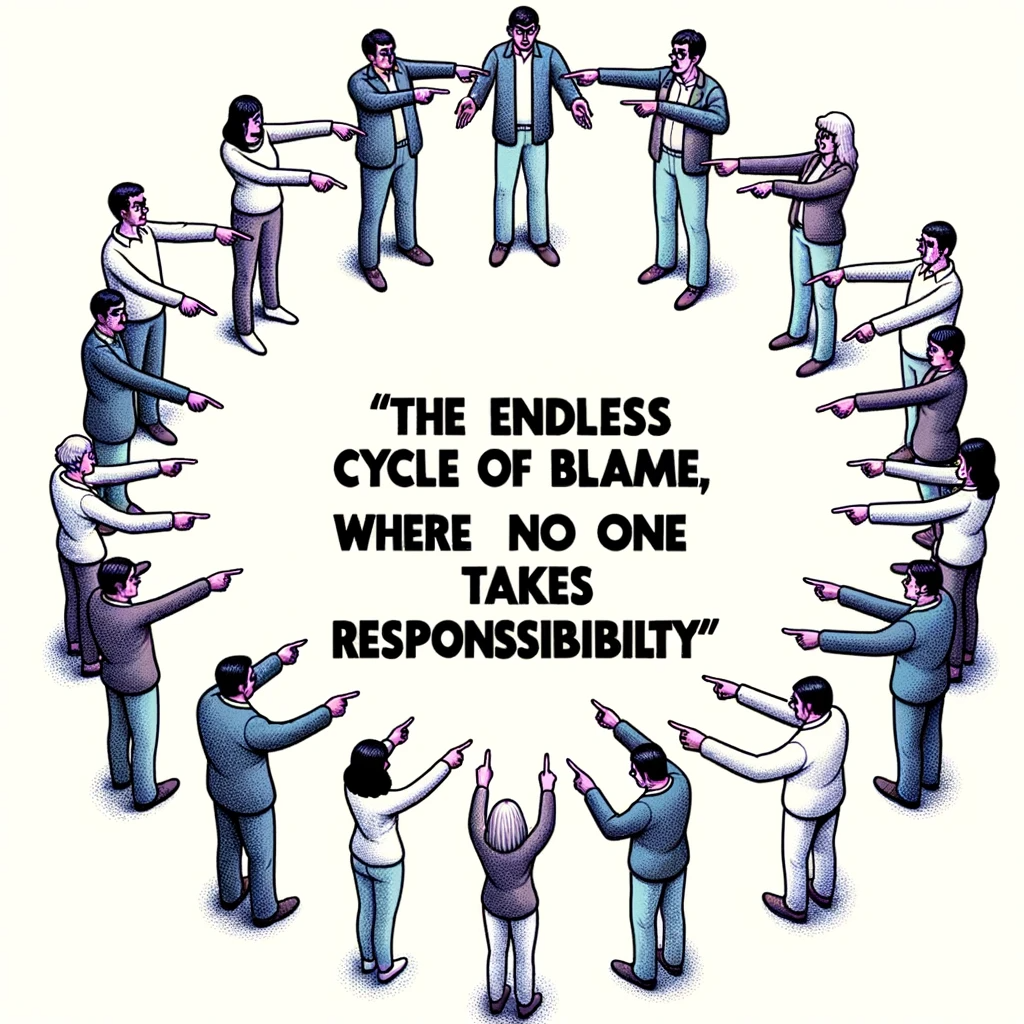Blame
Definition
Blame is a noun and a verb. As a noun, it refers to responsibility for a fault, mistake, or wrongdoing. As a verb, it means to assign responsibility or hold someone or something accountable for a fault or problem.
Parts of Speech
- Noun
- Verb
Pronunciation
American English
- IPA Pronunciation: /bleɪm/
- Respelling: blaym
British English
- IPA Pronunciation: /bleɪm/
- Respelling: blaym
Etymology
The word "blame" originates from the Old French "blamer," meaning "to accuse" or "reproach," which in turn comes from the Latin "blasphemare," meaning "to speak ill of" or "revile." The term has been used in English since the 13th century, maintaining its meaning of assigning responsibility for a fault or mistake.
Derivatives
- Blameless (adjective)
- Blameworthy (adjective)
- Blamer (noun)
- Self-blame (noun)
- Blamingly (adverb)
Synonyms
- Accuse
- Fault
- Reproach
Antonyms
- Praise
- Exonerate
- Forgive
Usage
The noun "blame" is often used to indicate responsibility for a problem or wrongdoing. For example, "The blame for the accident fell on the driver." As a verb, it describes the act of holding someone accountable, as in "He blamed her for the error."
Related Terms
- Responsibility: The state or fact of being accountable for something.
- Fault: An error or defect for which someone may be blamed.
- Accusation: A claim or assertion that someone is at fault or responsible.
Detailed Definitions
Noun
- Responsibility for a fault or wrongdoing: Refers to accountability for an error, mistake, or failure.
- Example: "The manager took the blame for the project’s failure."
Verb
- To hold someone or something responsible for a fault or error: Describes the act of assigning responsibility for a negative outcome.
- Example: "She blamed the weather for the delay."
blame



🇨🇳 Mandarin (Chinese)
- 责怪 (Referring to blame as a verb, to fault someone)
- IPA Pronunciation: /ʈ͡ʂɤ˧˥ kwaɪ̯˥˩/
- Respelling: zhé guài
- 过错 (Referring to blame as a noun, a fault)
- IPA Pronunciation: /kwo˩˥ tsʰwo˧˥/
- Respelling: guò cuò
🇮🇳 Hindi
- दोष देना (Referring to the act of blaming)
- IPA Pronunciation: /d̪oːʃ deːnaː/
- Respelling: dosh dena
- दोष (Referring to blame as a fault or error)
- IPA Pronunciation: /d̪oːʃ/
- Respelling: dosh
🇪🇸 Spanish
- culpar (Verb form meaning to blame someone)
- IPA Pronunciation: /ˈkul.paɾ/
- Respelling: kulpar
- culpa (Noun form referring to blame or fault)
- IPA Pronunciation: /ˈkul.pa/
- Respelling: kulpa
🇫🇷 French
- blâmer (Verb form of to blame)
- IPA Pronunciation: /blame/
- Respelling: blâmer
- faute (Noun form of blame or fault)
- IPA Pronunciation: /fot/
- Respelling: faute
🇸🇦 Modern Standard Arabic
- لوم (Verb form of to blame)
- IPA Pronunciation: /luːm/
- Respelling: loom
- عتب (Noun form of blame or reproach)
- IPA Pronunciation: /ʕitb/
- Respelling: 'itb
🇧🇩 Bengali
- দোষ দেওয়া (Act of blaming)
- IPA Pronunciation: /d̪oʃ de.oa/
- Respelling: dosh deoa
- দোষ (Blame or fault)
- IPA Pronunciation: /d̪oʃ/
- Respelling: dosh
🇷🇺 Russian
- винить (Verb form meaning to blame)
- IPA Pronunciation: /ˈvʲinʲɪtʲ/
- Respelling: vinít'
- вина (Noun form of blame or fault)
- IPA Pronunciation: /ˈvʲinə/
- Respelling: vina
🇵🇹 Portuguese
- culpar (Verb form meaning to blame)
- IPA Pronunciation: /ˈkulpaɾ/
- Respelling: kulpar
- culpa (Noun form of blame)
- IPA Pronunciation: /ˈkulpa/
- Respelling: kulpa
🇮🇩 Indonesian
- menyalahkan (Verb form meaning to blame)
- IPA Pronunciation: /mən.ja.la.kʰan/
- Respelling: meny-alah-kan
- kesalahan (Noun form of fault or error)
- IPA Pronunciation: /kə.sa.la.han/
- Respelling: ke-salah-an
🇩🇪 German
- beschuldigen (Verb form of to blame)
- IPA Pronunciation: /bəˈʃʊldɪgən/
- Respelling: beschuldigen
- Schuld (Noun form of blame or guilt)
- IPA Pronunciation: /ʃʊlt/
- Respelling: Schuld
🇯🇵 Japanese
- 非難する (Verb form meaning to blame)
- IPA Pronunciation: /hinan suru/
- Respelling: hínan suru
- 非難 (Noun form of blame or criticism)
- IPA Pronunciation: /hinan/
- Respelling: hínan
🇻🇳 Vietnamese
- trách (Verb form of to blame)
- IPA Pronunciation: /ʈʂaːk̚˧˩/
- Respelling: trách
- lỗi (Noun form of fault or error)
- IPA Pronunciation: /lɔi˧˥/
- Respelling: lỗi
🇰🇷 Korean
- 탓하다 (Verb form meaning to blame)
- IPA Pronunciation: /tʰa̠t̚.ha̠.da̠/
- Respelling: tat-hada
- 탓 (Noun form of blame)
- IPA Pronunciation: /tʰa̠t̚/
- Respelling: tat
🇹🇷 Turkish
- suçlamak (Verb form of to blame)
- IPA Pronunciation: /sutʃlaˈmak/
- Respelling: suçlamak
- suç (Noun form of fault or blame)
- IPA Pronunciation: /sutʃ/
- Respelling: suç
🇵🇰 Urdu
- الزام دینا (Act of blaming)
- IPA Pronunciation: /ʔilzaːm diːnaː/
- Respelling: ilzaam dena
- الزام (Blame or accusation)
- IPA Pronunciation: /ʔilzaːm/
- Respelling: ilzaam





